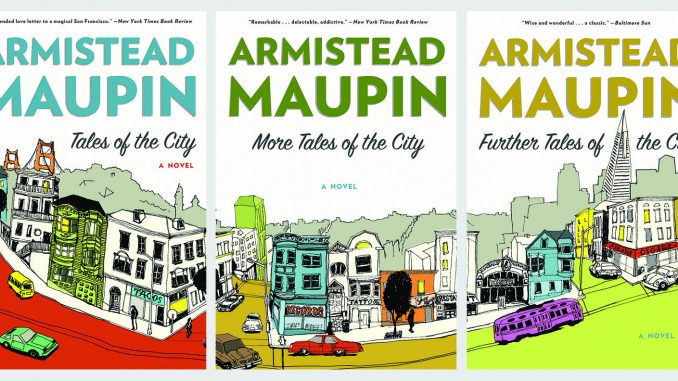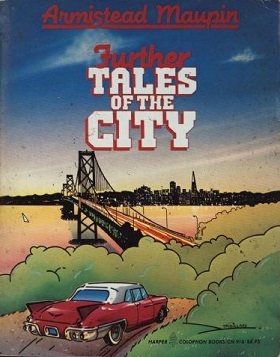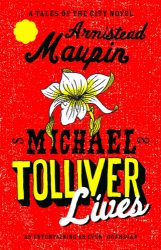
 Many of Dickens, Wilkie Collins and Conan Doyle’s novels started life as magazine serials. This way of publishing new work remained popular in the USA and the first four titles in the ‘Tales of the City’ sequence appearing as regular instalments in the San Francisco Chronicle, and the fifth appeared in the San Francisco Examiner. The change in style of the sixth book, ‘Sure Of You’, which was written as a novel first is obvious, with a much more linear narrative. When BBC Radio 4 dramatised all 9 books from 2013, ‘Sure of You’ was mixed in with the previous book ‘Significant Others’ as there were fewer of the independent scenes that made up the early stories, and which were used to frame the radio plays. There were 3 further books that picked up the story 20 years later.
Many of Dickens, Wilkie Collins and Conan Doyle’s novels started life as magazine serials. This way of publishing new work remained popular in the USA and the first four titles in the ‘Tales of the City’ sequence appearing as regular instalments in the San Francisco Chronicle, and the fifth appeared in the San Francisco Examiner. The change in style of the sixth book, ‘Sure Of You’, which was written as a novel first is obvious, with a much more linear narrative. When BBC Radio 4 dramatised all 9 books from 2013, ‘Sure of You’ was mixed in with the previous book ‘Significant Others’ as there were fewer of the independent scenes that made up the early stories, and which were used to frame the radio plays. There were 3 further books that picked up the story 20 years later.
The 6 original books follow the journey of Mary Ann Singleton through San Francisco in the 70s and 80s. From her arrival from Cleveland to her departure to New York she is the central character around which the stories are woven. The other key player is Michael Tolliver, who it becomes clear is based on the author. Indeed Michael’s letter coming out to his parents towards the end of ‘More Tales of the City’ is as close to an LGBT manifesto as Maupin gets anywhere in his work.
The serialisation of the early books mean they have a great sense of time and place. DeDe Halcyon winds up at a health resort with a thinly disguised Elizabeth Taylor. Jonestown plays a bog part in the second book and Rock Hudson whose name is redacted in the text, hosts a party attended by Michael in the third. Indeed it’s Hudson’s passing in the fourth book that signals the switch from the carefree, hedonistic lifestyle of the 70s in both the LGBT and heterosexual communities to a city haunted by the spectre of AIDS. That fourth book, ‘Babycakes’, is at least for a British audience the least successful. The lazy portrayal of Britain as some sort of theme park populated exclusively by Dick VanDyke and Queen Victoria grates against the humour of the book, and the pathos of Brian and Mary-Ann’s struggles with having a baby.
That last story is the one that highlights what ‘Tales of the City’ is really all about: lives. The fact that many of them are LGBT lives is almost incidental, it is just part of who these individuals are. Maupin writes people as well as anyone. His insightful writing of the baby thread proves shows that he is concerned with showing how the lives in the tales are woven together, regardless of who they are and how they live. Mary-Ann’s changing attitude to Michael over the books from wariness of a gay man to a close friendship, a pulling away as his HIV status changes to acceptance and a renewed bond. Where Michael is the author, Mary-Ann is society with her shifts in attitudes and understanding of the LGBT community.
 The later books pick up the story 20 years later. Michael Tolliver Lives is the most autobiographical of the books. Written in the first person as Michael, it introduces some new elements. There has always been a streak of absurd humour, chasing around Alaska after Jim Jones, was he or wasn’t he the real one? The clash of worlds between the Reaganite gentlemen’s club and a lesbian music and arts festival. Here Michael acquires a previously unmentioned brother who is his opposite in almost every way. Intended as a figure of fun and a way to lampoon the consumerist world, he just comes across as a pathetic figure, and is never heard of again in later books. Mary Ann Singleton reappears in the next book ‘Mary Ann in Autumn’. The narrative switches back to the third person with the style also reverting to a series of interdependent scenes. Her second marriage is collapsing and in ill health she returns from New York to seek support from Michael. The problem here is that Maupin starts tying up loose ends from earlier books that weren’t really loose ends at all. One of the appeals of the Jim Jones story and many others is that we never get a resolution, the stories, as in real life, just fade away.
The later books pick up the story 20 years later. Michael Tolliver Lives is the most autobiographical of the books. Written in the first person as Michael, it introduces some new elements. There has always been a streak of absurd humour, chasing around Alaska after Jim Jones, was he or wasn’t he the real one? The clash of worlds between the Reaganite gentlemen’s club and a lesbian music and arts festival. Here Michael acquires a previously unmentioned brother who is his opposite in almost every way. Intended as a figure of fun and a way to lampoon the consumerist world, he just comes across as a pathetic figure, and is never heard of again in later books. Mary Ann Singleton reappears in the next book ‘Mary Ann in Autumn’. The narrative switches back to the third person with the style also reverting to a series of interdependent scenes. Her second marriage is collapsing and in ill health she returns from New York to seek support from Michael. The problem here is that Maupin starts tying up loose ends from earlier books that weren’t really loose ends at all. One of the appeals of the Jim Jones story and many others is that we never get a resolution, the stories, as in real life, just fade away.
The most awkward loose end for Maupin seems to be the series’ most iconic character Anna Madrigal. Revealed as a transgender woman early in the series she is one of the best-written people in the books. In the last book, ‘The Days of Anna Madrigal’, however she has morphed into a “gay icon” in the city. This sits at odds with Anna as she has been written in all the earlier books, a person who has found peace with herself and just wants to live their life. She was clearly always a personality in the Russian Hill area of San Francisco, but as an eccentric not for her background. Again Maupin seeks to show the “ordinariness” of being gay, until this last book. Anna has always said that her chosen name was an anagram but been coy about what it stood for. In this book she goes back to her roots in Winnemucca Nevada and in the clumsiest piece of plotting in all the books reveals the genesis of her name. She then ends up with the whole cast at the Burning Man festival, an unlikely place for many of them, where it is implied that she passes away while being cheered by the assembled LGBT community.
I’ve tried to not give away too many of the plot twists in these 9 books which weave in and out of each other, and while the last one in particular is less than satisfying in places, they are all among the best descriptions of the human condition you will find in writing. The characters and places are brilliantly real, and you become invested in them all, and will them on through their lives. I love ‘Tales of the City’ and read them all, right through, every couple of years. After numerous times I still get a sense of anticipation when I read the opening line, “Mary-Ann Singleton was 25 years old when she saw San Francisco for the first time”…


